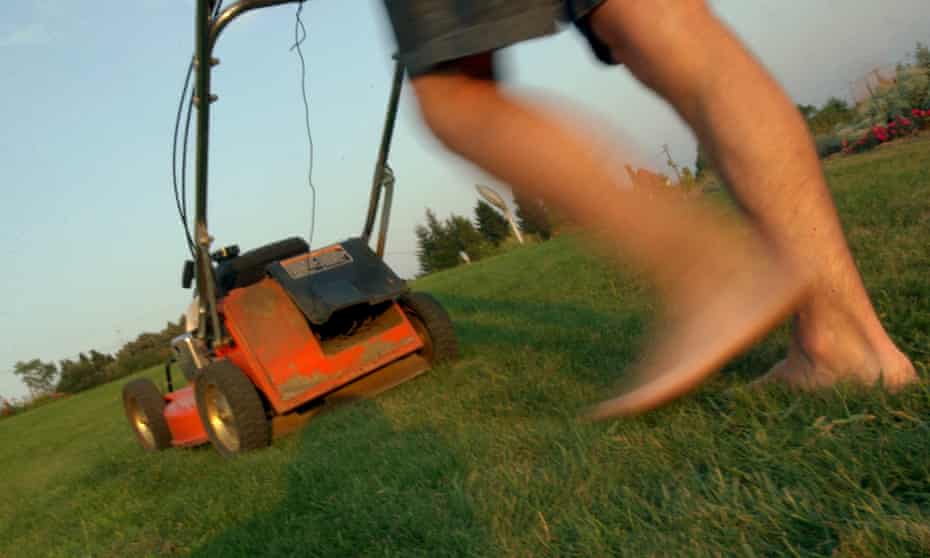California’s landscapers to bear brunt of ban on gas-powered lawnmowers
The state’s move to electric off-road engines will cut noise and pollution – but some businesses are far from happy

Last modified on Sun 31 Oct 2021 06.03 EDT
Sometimes I wish I lived in California. It’s not just the weather or In-N-Out Burgers, it’s simpler than that. It’s the peace and quiet I’d soon be experiencing when the state’s new ban on gas-powered engines takes effect. No loud leaf blowers drowning out my Zoom calls. No lawnmowers grooming my neighbor’s yard as I’m trying to concentrate.
The state’s governor, Gavin Newsom, in his effort to achieve 100% zero emissions, has signed a new bill that bans the sale of small off-road engines by 2024. And while I’m sure many people will welcome the less noisy electrical replacements that will soon be widely used, many small business owners in the landscaping and construction industries are not happy.
“It’s estimated that California has at least 50,000 such microbusinesses,” writes Dan Walters in the Times of San Diego. “Mowing a lawn once a week is one thing, but pros do it a dozen or more times a day to keep their families housed and fed. They would have to not only buy the equipment but dozens of batteries and chargers and have the facilities, including sufficient electric power supplies, to recharge those batteries.”
According to the California Air Resources Board, there are 16.7m small engines in California. Approximately 77% are used to power residential lawn and garden equipment, while federally regulated construction and farming machinery make up 11%. The remaining 9% is attributed to commercial lawn and garden businesses.
Andrew Bray, a vice-president at the National Association of Landscape Professionals, told the Los Angeles Times that “a three-person landscaping crew will need to carry 30 to 40 fully charged batteries to power its equipment during a full day’s work,” adding, “these companies are going to have to completely retrofit their entire workshops to be able to handle this massive change in voltage so they’re going to be charged every day.”
Miguel Rojas, a landscaping company owner in Los Angeles, objects to the new law. “This is just going to hurt us, as electric ones don’t last as long due to the battery life,” he told the California Globe. “And we wear masks and other protective equipment, so we’re fine using the gas ones. Maybe the writers of this should mow a lawn a few times before judging what’s best for us.”
Environmentalists that side with the bill are not as concerned. They agree that electric models are more expensive than their gas-powered equivalents but also point out that they offer long-term cost savings to the small business owner.
Daniel Mabe, founder and president of the American Green Zone Alliance – an organization that teaches companies how to best use, store and maintain equipment as well as how to safely handle, repurpose and recycle lithium batteries, told the Hustle that a high-end two-stroke gas leaf blower costs about $1.20 an hour (including gas, oil and preventive and repair maintenance), while a comparable electric blower costs from $0.18 to $0.20 an hour to use at full power and, if it doesn’t rain much (like in many parts of California), the cost can actually come down to as little as $0.08 to $0.15 an hour.
The state is also doing its best to help small businesses by offering approximately $30m in aid. But given the number of businesses that would need this kind of assistance, the net effect would probably come down to only hundreds of dollars for each company.
As a small business owner and advocate, I sympathize with the tens of thousands of companies in California that will be affected by this new legislation. And although I’m not a supporter of excessive regulations I do believe that we must do everything reasonable to protect our environment for future generations. Sometimes, government can help move the needle in that direction.
One thing’s for certain: this experiment will be closely watched. I’m expecting to see a surge in sales of new and affordable battery-powered lawn equipment like these products in the coming years. And then of course there will always be business owners who will figure out ways to get around the regulations. Like Rojas.
“We’re just going to go to Mexico, Nevada, Arizona, anywhere, and get the ones we want,” he says. “Or if they ban using new ones, we’ll just replace the motors of the old ones because they work better. I don’t know how much more out of touch these people can get.”